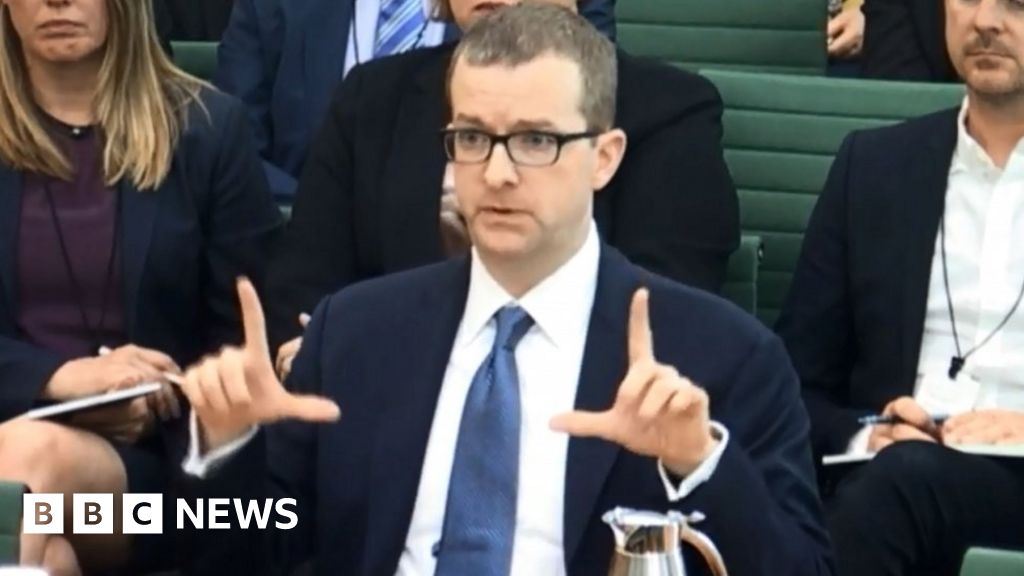Facebook's Zuckerberg Faces Formal Summons From MPs

 Image copyright
AFP/Getty
Image copyright
AFP/Getty
MPs have urged Facebook founder Mark Zuckerberg to speak to them after evidence given by his chief technology officer was deemed unsatisfactory.
A parliamentary committee said Mr Schroepfer had failed to fully answer 40 points put to him as part of an inquiry into fake news.
The Digital, Culture, Media and Sport Committee's chairman said a formal summons to Mr Zuckerberg could follow.
Mr Schroepfer has promised to address the MPs' unresolved queries.
"Mark Zuckerberg's right-hand man, whom we were assured could represent his views, today failed to answer many specific and detailed questions about Facebook's business practices," said committee chair Damian Collins.
"We will be asking him to respond in writing to the committee on these points; however, we are mindful that it took a global reputational crisis and three months for the company to follow up on questions we put to them in Washington DC on 8 February."
He added that if Mr Zuckerberg did not respond positively, the committee would issue a "formal summons for him to appear when he is next in the UK".
"There are over 40 million Facebook users in the UK and they deserve to hear answers from Mark Zuckerberg about the company he created and whether it is able to keep its users' data safe."
'Mistake made'
During testimony from chief technology officer Mike Schroepfer, MPs accused Facebook of "bullying" the Guardian newspaper when it informed the company about a major data breach.
Mr Schroepfer was asked why Facebook had threatened to sue the newspaper over its story about the Cambridge Analytica data scandal.
He was also asked why it did not immediately inform users that their data had been used without consent.
"It was a mistake that we didn't inform people at the time," he said.
On the issue of bullying, he said: "I am sorry that journalists think we are preventing them getting the truth out."
There were a series of questions put to Mr Schroepfer to which he replied: "I don't know."
He admitted that the company had not known until recently that a current Facebook employee had been the business partner of Aleksandr Kogan, the Cambridge academic who designed the app that harvested user data on behalf of Cambridge Analytica.
He also revealed that no-one at Facebook had read the terms and conditions that Dr Kogan had put on the app he had designed, which went on to harvest information from millions of users.
At one point, MPs voiced their frustration with his replies. "You are the chief technology officer, why don't you know?" he was asked.
User controls
Mr Schroepfer was also grilled on the wider issue of political advertising.
The Department of Culture, Media and Sport Select Committee's chairman Damian Collins accused Facebook of having tools on its platform that "work for the advertiser more than they work for the consumer".
Mr Schroepfer promised to make political advertising far more transparent in the future but admitted that there was currently no way for people to opt out of it entirely.
"You can mute an ad from a specific advertiser, and there are a set of controls of your basic interests and preferences that you can change or remove."
"That puts a lot of work on the user," replied Mr Collins.
His questions to Mr Schroepfer were tough from the outset.
"What is the next car you will buy, what is the square footage of your house?" asked Mr Collins in his opening question.
"I don't know," replied Mr Schroepfer.
"But these are things that Facebook knows about us, isn't it?" pressed Mr Collins.
Mr Schroepfer said he thought it "unlikely" that Facebook had that level of data about his life.
"It knows I like coffee and there are certain things that I am interested in like technology, travel and cats," he said.
Mr Collins asked whether the Internet Research Agency, a Russian-based troll farm that churned out fake news during the US presidential campaign, had used Facebook's targeting tools.
"I don't know specifically," said Mr Schroepfer.
"It is a terrible idea that a nation state is using our product to interfere in a democratic election by masquerading as citizens of the US. We were slow to understand the impact of this," he said.
MPs had wanted Facebook founder Mark Zuckerberg to appear before them, but he declined.
From Chip War To Cloud War: The Next Frontier In Global Tech Competition
The global chip war, characterized by intense competition among nations and corporations for supremacy in semiconductor ... Read more
The High Stakes Of Tech Regulation: Security Risks And Market Dynamics
The influence of tech giants in the global economy continues to grow, raising crucial questions about how to balance sec... Read more
The Tyranny Of Instagram Interiors: Why It's Time To Break Free From Algorithm-Driven Aesthetics
Instagram has become a dominant force in shaping interior design trends, offering a seemingly endless stream of inspirat... Read more
The Data Crunch In AI: Strategies For Sustainability
Exploring solutions to the imminent exhaustion of internet data for AI training.As the artificial intelligence (AI) indu... Read more
Google Abandons Four-Year Effort To Remove Cookies From Chrome Browser
After four years of dedicated effort, Google has decided to abandon its plan to remove third-party cookies from its Chro... Read more
LinkedIn Embraces AI And Gamification To Drive User Engagement And Revenue
In an effort to tackle slowing revenue growth and enhance user engagement, LinkedIn is turning to artificial intelligenc... Read more

